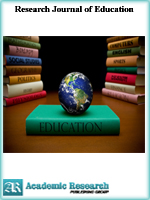Research Journal of Education
Online ISSN: 2413-0540
Print ISSN: 2413-8886
Print ISSN: 2413-8886
Quarterly Published (4 Issues Per Year)

Archives
Volume 4 Number 5 May 2018
The Optimization of Early Childhood Scientific Approaches to the Center of Play in Kindergarten Fastabiqul Khairat Samarinda
Authors: Liana Heppy ; Utami Dewi
Pages: 78-81
Abstract
The purpose of this study is to describe: (1) the designing effort of learning with scientific approach to 5-6 year olds in the playing center, (2) optimizing the scientific approach to 5-6 year olds in the playing center, and (3) the development of cognitive intelligence of 5-6 olds after learning using scientific approach at the TK Fastabiqul Khairat Samarinda playing center. This study uses a qualitative approach. Respondents of this study are educators and learners. Data collection by interviewing educators. In addition, interviews were also conducted observation on 16 students as well as documentation. The data were analyzed based on interaction analysis model, they are data collecting, data reduction, data display, and conclusion / verification drawing. From the interaction of these four components, form a data analysis cycle, namely (1) data collection, (2) data reduction, (3) data display, (4) conclusions / verification. And the research draws to the following conclusions: (1) the lesson plan to optimize the child’s scientific approach involves all teachers and head of TK Fastabiqul Khairat Samarinda and all made according to the needs of the children or the children’s age with the curriculum 2013 as reference. (2) The use of implementation looks good at all Playing centers. At every activity, children are given the opportunity to observe, ask, collect information, share and communicate optimally. (3) Cognitive development of 5-6 year old children in TK Fastabiqul Khairat Samarinda generally reached its indicators.
Research on the Impact of Entrepreneurship Education Pedagogy on College Student Entrepreneurship Intention
Authors: Yiping Liu ; Danqing Ma
Pages: 69-77
Abstract
In response to the policy of Ministry of Education, colleges in China revised their undergraduate degree curriculum to include entrepreneurship education. We conducted a research on 318 undergraduate students from Nanjing University of Aeronautics and Astronautics to study the impact of seminar-based and traditional entrepreneurship education pedagogy on college student entrepreneurial intention, by hierarchical regression analysis. In addition, the article researched the moderation effect caused by the different education pedagogy on ‘entrepreneurial attitude affects entrepreneurial intention’ and ‘entrepreneurial confidence affects entrepreneurial intention’ by introducing the segmentation variables of entrepreneurial attitude and entrepreneurial confidence to the model. The findings of this research have important empirical implications toward future college education reformation.



